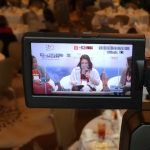VEI Advisory Board members Ruud Janssen, CMM, DES, CED, managing director for Basel, Switzerland–based The New Objective Collective, and strategic meetings management coach Debi Scholar, GLP, GTP, CMM, CMP, SSGB, CTE, CTT, CBST, both have a lot of credentials — and reasons for driving digital events.
How did you first become interested in digital events?
Ruud Janssen, CMM, DES, CED Very early on in my career as a hotelier, I become familiar with the intricacies of point-to-point connections using ISDN and satellite uplinks for events (this was in the early ’90s, prior to the internet). The cost of connection and the hassle was quite a struggle but the learning invaluable. Later, I was co-organizer of Event Camps, where we experimented heavily to test the boundaries where [online and live experiences] would cross. Exciting times some seven years ago. As the internet developed, we put it to the test again at a global hybrid event for the Internet Society in 2015 — and it was a roaring celebration of the possibilities of digital events.
Debi Scholar, GLP, GTP, CMM, CMP, SSGB, CTE, CTT, CBST My first career was in training and development in the mid-’90s at PricewaterhouseCoopers, where I encouraged my training team to learn more about e-learning and to facilitate training through the use of NetMeeting, an early Microsoft collaboration tool. We started educating hundreds of people around the world using one trainer, and the methodology quickly gained popularity. I became the volunteer e-learning field editor for the American Society for Training & Development (ASTD) in 1999. Transitioning into events in 2000, I educated meeting planners on virtual events as an option during the sourcing process.
What developments are you seeing?
RJ The need to be able to have safe, en-crypted point-to-point connections at a broad range of high and low bandwidth is critical. As users and organizers become more familiar with the possibilities, the fear factor is shrinking, which is good. Also, being comfortable using mobile instead of fixed connections is growing more accepted.
DS Digital events are becoming the norm for most meetings and events, and planners must also understand the technology options for 365/24/7 perpetual environments, so that participants may continue to learn and network with each other. Organizations should work with global virtual suppliers that are IT vetted, have flawless security and authentication processes, and understand the privacy requirements of each country. Moreover, digital suppliers who consult on how to measure meeting objectives and provide integration with meeting applications, hosting platforms, customer-relationship management tools, social-media platforms, and learning-management systems will gain more business, because organizations are seeking strategic digital partners.
What industries are taking a lead?
RJ There are hardly any industries today that don’t work with distributed workforces, customers, or partners. That requires embracing multiple technologies as they become available. I do see that more established (traditional) industries like banking and insurance, pharma, and the like are slower in adoption in their professional environments than other industries. The technology lag in larger firms where ICT [information and communication technologies] have a strong grip and are slow to adapt tend to stick to the more traditional ways, citing safety of data and security as threats to speeding up the use of digital events. It’s the tail wagging the dog.
DS The early adopters to hybrid/digital events were tech and management consulting, and other industries embracing innovation, research and development, and continuous improvement — aerospace, education, entertainment, health care, and telecom — followed. Organizations in cost-containment or reduction mode move toward more digital events to save on travel.
Final thoughts?
RJ Everyone is equipped with strong computing power in their pockets (i.e., smartphones), and the personal experience will drive the professional needs. Oftentimes I see employees of larger firms struggling with older technologies and feeling “left behind” when compared to the agility and adoption of technologies in smaller firms. There are now solutions that are able to cope with the enterprise-level security required, and the case should be made by the user to work with today’s technology. Soon there will be no distinction between live and digital events — the boundaries are fading, so be curious, and test the boundaries until they disappear. I am positive the transitional phase we are currently in is temporary. So design with the end in mind — the rest will follow, whether online or offline.
DS Meeting-management companies must get on the bandwagon and educate their meeting planners on how to deliver both face-to-face and digital events. Hybrid or all-digital meetings are another meeting type — we expect our meeting agencies to come to the table with innovative ideas, and reliable, global suppliers to fulfill all aspects of an event. .



